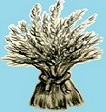2018.05.10 What is trust?
Trust appears to involve two aspects, our psyche and senses. One is internal based and the other external based. Trust involves relying on an image, verbal in humans, of another object perceived by the senses. The relationship involves action and predictable reactions, within the limits that are tolerable for the needs and expectation of that relationship.
In therapy, the development of trust proceeds along the line of predictability for the habits formed or ingrained in the course of repeated meetings. What interferes with the development of trust is an inability to form an image of the other or to be unable to process the image being projected. The inability may be due to the over excitement of the client's thought processes inherent in her makeup. If this is so, the therapeutic relationship needs to be built on awareness and calmness (mindfulness) shown by the therapist.
For people with PTSD, trust is often cited as missing. While lack of trust is a positive thing and beneficial to the psyche of the client, the absence of trust is not complete nor unable to be supplemented or diminished even more. Acknowledge the areas where trust does exist, to include the beginnings of the therapeutic relationship with all the validation that is beneficial and truthful to the client. When she is truly ready to explore PTSD inception ask what are the feelings that trust allows and the loss of safety concerns because she trusts.

Add new comment